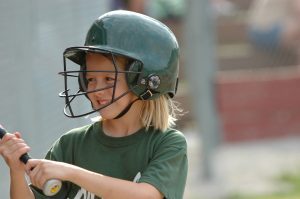With the increase in outdoor activity during warmer temperatures, there may be an uptick in risk for eye injury. Mass Eye and Ear has the only dedicated eye emergency room in New England that’s open 24/7, and doctors there note that in the summer, certain cases are more likely to come in.
Focus spoke with Dr. Elizabeth Rossin, Dr. Grayson W. Armstrong, and Dr. Matthew Gardiner, who are part of the Emergency and Trauma Eye Care service at Mass Eye and Ear. Below, they share what eye injuries and ailments they see most during the summer and how people can stay safe.
Yard Work-Related Injuries
Summertime can be a great time to revisit that yard work or woodworking project you’ve been putting off all winter. Unfortunately, the Emergency Department at Mass Eye and Ear typically sees a rise in injuries related to these outdoor yard work-related activities this time of year.
“Most commonly, we’ll see people who are in construction, or doing yard work around their house, come in with a nail, or piece of wood or metal, that’s injured their eye” says Dr. Rossin.
These injuries can cause permanent damage to the eye, and may require immediate surgery. Whether you’re grinding metal in the garage working on your car, pulling out fence posts or planting in the garden, always wear eye protection. The experts recommend safety glasses with shatterproof lenses.

Swimming with Contact Lenses
An estimated 45 million Americans wear contact lenses, and some contact lens users may be tempted to jump into a pool or cool off at a water park on a hot summer day. Swimming while wearing your contact lenses can result in serious eye infections that may cause corneal ulcers and could lead to vision loss.
“People need to be diligent with their outdoor activity if they wear contacts,” warns Dr. Rossin.
This advice should apply for all types of water, even for a quick a dip in the lake or pond while camping.
“It’s never a good idea to get freshwater or saltwater in your eyes either, especially with contact lenses, since there are bacteria and organisms living in the water,” adds Dr. Armstrong.
Firework Injuries
There are many risks to the eyes when setting off fireworks, including blast injuries, thermal burns and scorched eyelids. People who are legally in this line of work should always wear safety goggles, according to Drs. Rossin and Armstrong.
But what many people might not realize is the risk of eye injury from simply being a spectator. “The people coming in with injuries are not necessarily the ones closest to the fireworks display. It’s the ones who are watching it,” Dr. Rossin points out.
If someone feels that they’ve gotten fireworks debris in their eyes, they need to seek medical attention. If you plan to watch fireworks this summer, wear protective eyewear.
Trauma from Playing
“Sports injuries to the eye increase during the summer time, so it’s important that people wear eye protection, especially if the activity involves fast-moving objects like the balls used in baseball, softball or squash,” says Dr. Armstrong. “We see a lot of paintball injuries this time of year too.”
Interestingly, a previous study he led found that more children are injured inside the home during the summer because they spend more time there than during the school year. Parents and guardians should remain vigilant both outdoors and indoors.

Sunlight-Related Eye Ailments
It’s important to protect your eyes in the sunlight with sunglasses, (polarized lenses are more ideal), especially if you are on or near the water. “The reflection can actually make the glare from UV rays worse,” says Dr. Armstrong. People may also develop a non-cancerous growth that can affect the eye and vision called a pterygium, which is a pink triangular mass over the cornea that is sometimes referred to as “Surfer’s Eye” given its prevalence in people who spend a lot of time on the water.
He also points out that skin cancer rates are disproportionately high around the eyes compared to other areas of the body, so sunscreen should always be worn.
What should you do if you experience an eye injury?
The experts note that if you suspect you have an eye injury, you should seek care from an emergency room staffed with ophthalmologists.
“Be sure to get treated as soon as possible if you experience an eye injury, as there is potential for vision loss,” advises Dr. Matthew Gardiner, director of Emergency Eye Services at Mass Eye and Ear.
About Our Experts

Elizabeth Rossin, MD, PhD, is an ophthalmologist who served as director of the Ocular Trauma Service at the Mass Eye and Ear, Main Campus from 2018-2019. She will continue on at Mass Eye and Ear and Harvard Medical School as a Vitreoretinal Fellow.

Grayson W. Armstrong, MD, MPH, is an ophthalmologist who sees patients at Mass Eye and Ear, Malden.

Matthew Gardiner, MD, is an ophthalmologist and the director of Emergency Eye Services at Mass Eye and Ear, Main Campus. He is also the medical director of Ophthalmology at Mass Eye and Ear, Stoneham.
Thank you…I learned a lot.
Thanks for reading and commenting!